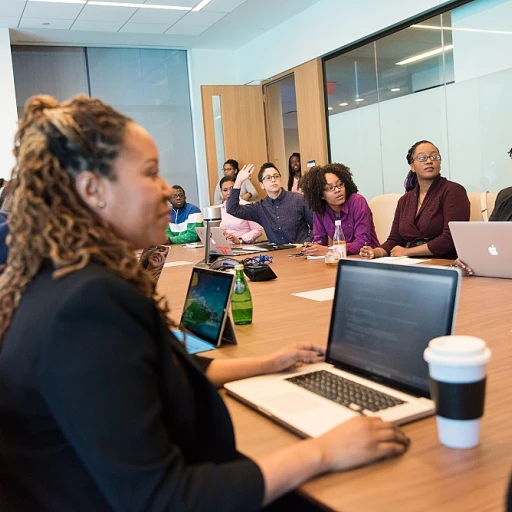Understanding AI in Recruitment
AI's Role in Modern Recruitment
Artificial intelligence is reshaping how companies find and hire talent. It's not just about speeding up the recruitment process; it's about making smarter decisions. With AI, recruiters can sift through massive amounts of data quickly, identifying the best candidates based on job descriptions and required skills. This technology is like having an extra set of eyes that never tire, ensuring that no potential candidate is overlooked.
From Resume Screening to Interview Scheduling
AI-driven tools are revolutionizing traditional recruiting methods. Resume screening, a task that once took hours, can now be completed in minutes. AI software analyzes resumes for relevant keywords, experience, and skills, providing hiring managers with a shortlist of top candidates. Furthermore, AI can handle interview scheduling, reducing the back-and-forth communication between recruiters and candidates, making the process more efficient and less time-consuming.
Predictive Analytics: The Game Changer
Predictive analytics is another aspect of AI that's gaining traction in recruitment. By analyzing past hiring data, AI can predict which candidates are likely to succeed in a role. This data-driven approach helps companies not only in talent acquisition but also in improving the overall candidate experience. It allows recruiters to make informed decisions, reducing the risk of a bad hire.
Human Touch in AI Recruitment
While AI offers numerous advantages, the human element remains crucial. AI can handle data, but it can't replace the empathy and understanding that human recruiters bring to the table. It's about striking a balance between technology and personal interaction. Recruiters should use AI as a tool to enhance their capabilities, not replace them.
For more insights on how AI and HR analytics are transforming recruitment strategies, check out this article.
Key Benefits of AI-Based Recruitment Analytics
The Advantages of AI-Based Recruitment Tools
AI-driven analytics have completely changed the hiring process, allowing companies to recruit candidates more efficiently and effectively. Recruiters are using AI tools to not only improve the quality of talent acquisition but also to streamline their workflow.- Efficiency at its Best: AI helps automate repetitive tasks like resume screening and interview scheduling. By doing so, hiring managers can spend more time focusing on evaluating candidates' skills and experience.
- Better Matching: Utilizing machine learning and data-driven insights, AI recruitment software can better match job descriptions with candidate resumes. This results in a more refined talent pool and improved candidate sourcing.
- Enhanced Candidate Experience: AI plays a crucial role in improving the candidate experience by ensuring timely communication and personalizing the recruitment process.
Improving Decision-Making with AI
Decision-making in recruitment has always been a critical challenge for recruiters. AI-driven tools offer predictive analytics that assists in identifying the best candidates by analyzing past data and current trends. This helps in making more informed hiring decisions which reduce the risk of bad hires.AI's Impact on Time and Cost
Time is money, especially in recruitment. AI cuts down the time spent on initial candidate screening, allowing recruiters more time to connect and converse with potential hires. This reduces the cost-per-hire and quickens the recruitment process, benefiting companies by filling positions faster.Boosting Objectivity in Hiring
Bias often creeps into traditional recruitment processes, consciously or unconsciously. AI tools, however, utilize natural language processing and data analytics to deliver unbiased candidate screening processes. These systems focus on skills and qualifications, ensuring a fair assessment.Transform Your Hiring with Data-Driven Insights
Companies adopting AI-based recruitment analytics notice a dramatic improvement not only in their talent acquisition strategies but also in employee retention rates. By using data-driven recruiting tools, businesses can continuously adapt and enhance their recruitment strategies. To explore more about emerging recruitment analytics trends, this resource provides insightful information. The potential for companies using AI in recruitment is just scratching the surface. As AI in HR continues to evolve, organizations maximizing these tools can expect to see greater efficiencies, better hiring outcomes, and a stronger workforce.Challenges and Considerations
Overcoming AI Challenges in Recruitment
While AI-driven analytics are transforming recruitment, they come with their own set of challenges. Let's break down some of the hurdles companies face when integrating AI into their hiring process.
Data Privacy and Security
One of the most pressing concerns is data privacy. With AI systems handling sensitive candidate information, ensuring robust security measures is crucial. Companies must comply with regulations like GDPR to protect candidate data. This means recruiters need to be transparent about data usage and secure all information diligently.
Bias and Fairness
AI systems are only as unbiased as the data they are trained on. If historical data reflects biases, AI tools might perpetuate them. For instance, if past hiring favored a particular demographic, AI might inadvertently screen candidates in a biased manner. Regular audits and diverse data sets are necessary to mitigate this risk.
Integration with Existing Systems
Introducing AI tools into established recruitment processes can be challenging. Compatibility with existing recruiting software and tools is vital. Companies need to ensure seamless integration to avoid disruptions in the recruitment process. This often requires collaboration between IT and HR teams to align systems effectively.
Human Touch in Recruitment
While AI can streamline many aspects of recruitment, the human element remains irreplaceable. Candidates value personal interaction, and AI should complement, not replace, human recruiters. Balancing AI efficiency with human empathy is key to maintaining a positive candidate experience.
Training and Adaptation
Recruiters and hiring managers need to be trained to use AI tools effectively. This includes understanding how AI makes decisions and interpreting data-driven insights. Continuous learning and adaptation are necessary as AI technologies evolve.
In conclusion, while AI offers remarkable advantages in recruitment, addressing these challenges is essential for successful implementation. By tackling these issues head-on, companies can enhance their talent acquisition strategies and improve the overall hiring process.
AI Tools and Technologies
Tools and Technologies Reshaping Recruitment
In today's hiring process, artificial intelligence and machine learning are not just buzzwords—they're game-changers. Recruiters and hiring managers are increasingly turning to these advanced tools to tackle common challenges, like identifying the right talent and streamlining the recruitment process. The right recruiting software offers recruiters a chance to revolutionize how they source candidates, manage job descriptions, and handle resume screening. Applicant tracking systems (ATS), for instance, are now smarter, integrating AI to help sift through resumes, making candidate sourcing more efficient and, frankly, a whole lot easier. No more manual slogging through piles of resumes! These recruitment tools rely heavily on predictive analytics, offering data-driven insights to guide decision making. Whether you're hunting for a candidate with specific skills or looking to optimize your interview scheduling, AI is your co-pilot. Tools that use natural language processing can even analyze job descriptions, improving candidate experience by matching individuals to roles that fit them best. Some companies are reaping huge benefits from incorporating AI-driven insights. For instance, LinkedIn Talent Solutions has been utilizing machine learning to assist employers in identifying top candidates more quickly, significantly cutting down time spent on the recruitment cycle. While there's no one-size-fits-all software for every company, some notable mentions in the realm of AI recruiting tools include platforms like HireVue for AI-powered video interview analysis and Pymetrics for assessing candidates' soft skills using neuroscience games. The integration of AI in recruitment is not without its challenges, as discussed earlier. However, with proper implementation, these technologies can truly transform candidate acquisition, offering a more streamlined, efficient, and fair hiring process. Remember, the goal is to complement human intuition and expertise with these powerful tools, leading to better recruitment outcomes and a more satisfied workforce.Case Studies: Success Stories
Real-Life Wins with AI in Recruitment
Artificial intelligence is not just a buzzword in recruitment; it's a game-changer. Companies that have embraced AI-driven analytics are witnessing tangible benefits in their hiring process. Let's explore some real-life success stories that highlight the power of AI in talent acquisition.
Speeding Up the Hiring Process
One leading retail company faced the challenge of sifting through thousands of resumes for seasonal hires. By implementing AI-based resume screening tools, they reduced the time spent on initial candidate screening by 75%. This not only sped up the recruitment process but also allowed hiring managers to focus on interviewing the best candidates, improving the overall candidate experience.
Improving Candidate Sourcing
A tech startup struggled with finding candidates with the right skills for niche roles. They turned to AI-powered recruiting software that used machine learning to analyze data from previous successful hires. This predictive analytics approach helped them identify the most promising talent pools, resulting in a 40% increase in qualified candidates and a more efficient recruitment process.
Enhancing Decision Making with Data-Driven Insights
A global financial services firm leveraged AI to enhance their decision-making process. By utilizing recruitment software that analyzed historical hiring data, they could predict which candidates were likely to succeed in their roles. This data-driven approach not only improved their talent acquisition strategy but also reduced employee turnover by 30%, saving the company significant costs in rehiring and training.
Streamlining Interview Scheduling
Scheduling interviews can be a logistical nightmare, especially for large organizations. A multinational corporation used AI tools to automate interview scheduling, significantly reducing the back-and-forth communication between recruiters and candidates. This not only saved time but also enhanced the candidate experience, making the company more attractive to top talent.
Personal Touch in AI-Driven Recruitment
While AI offers numerous advantages, it's crucial to maintain a human touch in recruitment. One healthcare provider integrated AI with their existing recruitment tools to personalize job descriptions and tailor communication to individual candidates. This approach led to a 20% increase in candidate engagement, proving that AI and human insight can work hand in hand for better results.
These stories demonstrate that AI isn't just about efficiency; it's about creating a more effective and enjoyable recruitment experience for both candidates and recruiters. As AI continues to evolve, companies that embrace these technologies will likely see even more impressive results in their talent acquisition efforts.












